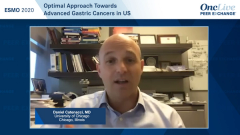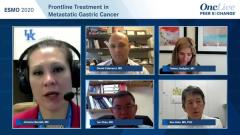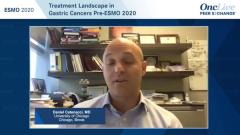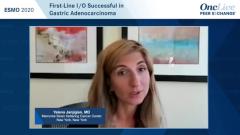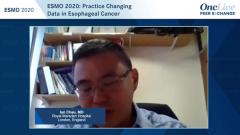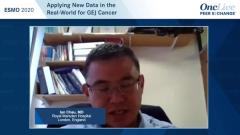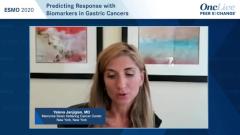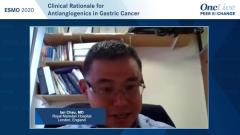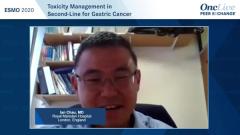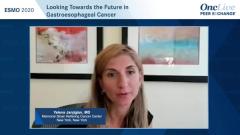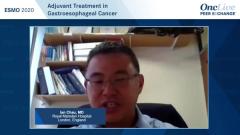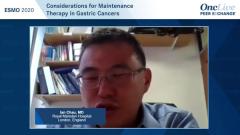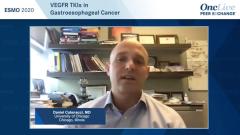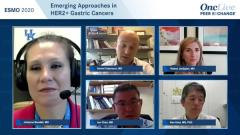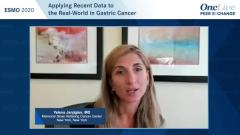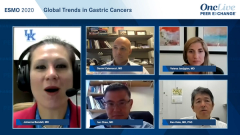
VEGFR TKIs in Gastroesophageal Cancer
Episodes in this series

Transcript:
Johanna Bendell, MD: Dan, we also have several targeted agents … in development right now for gastroesophageal cancers. Can you tell us a little bit about the FIGHT trial [NCT01800968], SPOTLIGHT trial [NCT03504397], and some of the trials we’re seeing with other vascular endothelial growth factor receptors [VEGFR] tyrosine kinase inhibitor [TKI] that are coming into play?
Daniel Catenacci, MD: Let’s start with the Claudin study. We have the SPOTLIGHT study, which is a phase 3 study, and the GLOW study [NCT02919592], which is sort of an Asian counterpart with CAPOX backbone and SPOTLIGHT with leucovorin calcium, fluorouracil, and oxaliplatin [FOLFOX]. This study is based on a randomized phase 2 study called the FAST study [NCT01630083] that was done with a different backbone of chemotherapy, the MAGIC backbone, but certainly showed benefit in patients selected by Claudin expression by immunohistochemistry. That was defined as 2+ or 3+ immunohistochemistry at least 40% of cells or higher, and a subgroup analysis of 70% or higher looked like it was even more predictive.
After transition of hands of the drug to a different company, renaming of the drug to zolbetuximab, that study is ongoing and probably about halfway accrued. Like many studies, it has suffered the problems with coronavirus disease 2019 and with accrual being on hold. That is a promising study. It’s going to be very interesting now with these new studies from yesterday and their impact on accrual to this study now, where the control arm is with FOLFOX alone, and you’re going to be having this challenge of patients, especially the ones who have high programmed death-ligand 1 scores, microsatellite instability high, they’re probably not going to be going on this study. That’s going to be a challenge, but we’ll see if it validates the randomized phase 2 FAST study.
Then we have the FIGHT study … a fibroblast growth factor receptor 2 [FGFR2]-based study, based on an earlier trial, the phase 1 and expansion study in FGFR2 gene amplified gastroesophageal cancer, which is about 5% of the disease. In a late-line monotherapy phase 1 expansion study showed a response rate of approximately 18%, 20%, which is promising and shows activity of a single agent drug.
That led to moving that into the first-line study in combination with FOLFOX. The selection criteria for that assay for that study … was not gene amplification, which is 5%, but rather immunohistochemistry [IHC] positive, which was turning out to be like 30% to 35% of patients. The study … accrued a lot quicker than expected because it was thought that the IHC 3+ would be only around 10% by IHC. … That study was downgraded from a phase 3 to a phase 2 in size to just sort of look at the outcomes before moving ahead with a larger sample set, and we expect those data to read out in the fall to the winter; we’ll see if that merits further progression in all of those patients or only in sort of the genomically driven patients, which probably would have a higher magnitude of benefit.
Then finally, you mentioned the TKIs, the antiangiogenesis TKIs, of which there are several studies. There’s the INTEGRATE II study [NCT02773524] with regorafenib in later line compared to placebo. There’s the anlotinib study [NCT02388919], another sort of multikinase with inhibition of the vascular endothelial growth factor receptors. There’s the FRUTIGA study [NCT03223376] of fruquintinib. All those studies are ongoing and in later lines. Then there was the negative study of the ANGEL study [NCT03042611], which was with apatinib compared to placebo in third-line setting or higher, despite an earlier study that was solely in China, which was a randomized phase 3 study that suggested benefit by overall survival in third-line setting or higher.
My take on these antiangiogenesis drugs in late line is that there’s probably sort of a marginal benefit hazard ratio of 0.85 and that many of these studies may just hit the mark, may just miss the mark, and may add another option in the toolbox for later line. I will say the data of combining these TKIs with an immune-oncology agent like regorafenib and nivolumab or lenvatinib and pembrolizumab, as has been shown in colon cancer, hepatocellular carcinoma, and now gastroesophageal cancer seems to have some sort of synergy at least in these smaller phase 2 studies, mostly from Asia. If that can be validated in larger sample sizes, some of which are already embarking on first-line studies, that will be interesting and exciting to see those results.
Transcript Edited for Clarity


